
Easterhouse support group’s closure is a symptom of a greater problem in our society.
Easterhouse Alcohol Information Service (AIS) closed its doors on Friday after 17 years work in one of the most deprived areas of Europe.
Sadly though, it’s not a case of “job done.” It’s a case of one heroic guy whose relentless efforts to find funding and outrun bureaucracy finally failed.
Ian ran the project voluntarily for 11 years before he could persuade grant-making bodies to pay a worker’s wage. It meant the group could put on a play, make a film, take folk away on residential outdoor trips and have free coffee.
It was a huge effort every year to fill in the forms, jump through the hoops, find the cash, monitor the project and then do it all over again 12 months later.
Now, though, funding’s dried up and Glasgow council’s decision not to renew a one-off emergency grant of £20k has been the last straw.
“So what?” you might say. Times are hard and Glasgow council must find £29 million in savings.
They say: “The service engaged with a small number of individuals, provided information that was more readily available elsewhere and was poorly connected to wider networks.”
In a way, that’s all true. In another, it completely misses the point.
Take Andy. He stumbled across AIS one morning on his way to the off-licence for a carry out.
Ian opened his doors at 7am because the offies opened at 8am. Back then, Andy weighed five stone and his doctor predicted he wouldn’t see Christmas.
Andy recalls: “I thought what the heck, and just kept drinking. I’d been to hospital and rehab. Nothing helped long-term. But then I came up the stairs to AIS. Now, I’m safe. I’ll never go back to the drink.”
So what worked?
“At the project you get a big welcome. If you’re drunk they send you home but you can come back when you’re sober. They aren’t regimental. They’re folk like me and we’re all in the same boat together.”
In fact, the project felt like family. Members didn’t have to give samples to prove their abstinence. It wasn’t clinical.
There was no well-dressed management and no emphasis on maintaining professional networks or joining planning partnerships. The only network that mattered was the close ties with one another.
People know when they are valued and when they are just a client in a bureaucratic machine. Sadly though, government doesn’t think this way.
AIS decided to build one of Scotland’s first Men’s Sheds a project borrowed from Australia that tackles isolation amongst older men by the practical task of building, maintaining and enjoying a shed and making items for the community like benches, planters and raised beds. Now that’s unlikely to happen.
According to Willie, a former community worker: “The council says it’s making ‘tough decisions’. When the provost uses a bus to get to civic functions, that’ll be tough.”
He’s right. If communities controlled more council cash, these neighbourhood projects would be last to go bail outs for Edinburgh and London bankers would be first.
So will this £20k saving actually save cash? If just one child comes into care or one adult is unemployed or hospitalised as a result of lost support, the council’s saving will become a cost within months.
Let’s face it. The amount of money needed to keep Ian’s project going zips through a city trader’s computer every second.
New figures show the UK is the fourth most unequal country in the developed world.
The fate of Easterhouse Alcohol Information Service helps explains why.

Enjoy the convenience of having The Sunday Post delivered as a digital ePaper straight to your smartphone, tablet or computer.
Subscribe for only £5.49 a month and enjoy all the benefits of the printed paper as a digital replica.
Subscribe